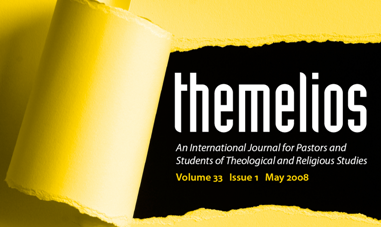In my last post, “Dissertation Defended,” I wrote, “I’ll share the abstract in a forthcoming post.” Here it is:
Doctoral Student: Andrew David Naselli
Dissertation Mentor: D. A. Carson
Dissertation Title: Paul’s Use of Isaiah 40:13 and Job 41:3a (Eng. 41:11a) in Romans 11:34–35
This dissertation examines the use of Isa 40:13 and Job 41:3a (Eng. 41:11) in Rom 11:34–35. Its structure generally follows the six-step approach used in Commentary on the New Testament Use of the Old Testament (ed. G. K. Beale and D. A. Carson; Grand Rapids: Baker, 2007). It addresses
- the NT context of Rom 11:34–35 [ch. 2]
- the OT context of Isa 40:13 and Job 41:3a [chs. 3–4]
- textual issues in Isa 40:13, Job 41:3a, and Rom 11:34–35 [ch. 5]
- relevant uses of Isa 40:13 and Job 41:3a in Jewish literature [ch. 6]
- Paul’s hermeneutical warrant for using Isa 40:13 and Job 41:3a in Rom 11:34–35 [ch. 7]
- Paul’s theological use of Isa 40:13 and Job 41:3a in Rom 11:34–35 [ch. 8]
It concludes that when Paul quotes Isa 40:13 and Job 41:3a, he includes their larger OT contexts, which reveal a remarkable typological connection between the two OT passages and the end of Romans 11. The three rhetorical questions in Rom 11:34–35 communicate three of God’s characteristics that correspond to his ways in salvation history, and each carries simple and profound theological implications. By quoting Isa 40:13 and Job 41:3a in Rom 11:34–35, Paul typologically connects Isaiah 40 and Job 38:1–42:6 with Romans 9–11 in order to exalt God’s incomprehensibility, wisdom, mercy, grace, patience, independence, and sovereignty.










